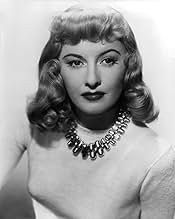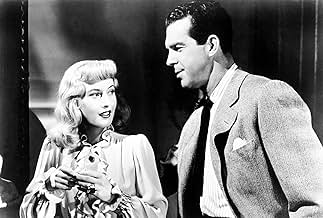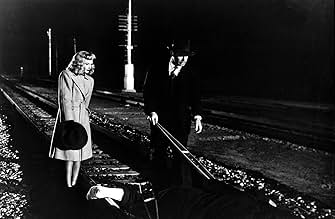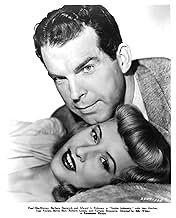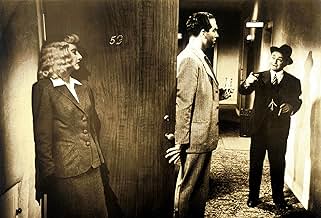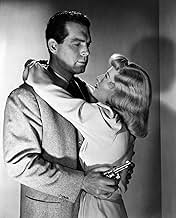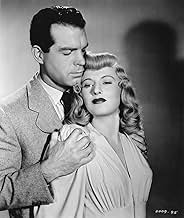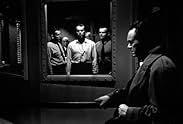Ein Versicherungsvertreter lässt sich zur Planung eines Mordes und Versicherungsbetrugs überreden, der schließlich den Verdacht eines Versicherungsdetektivs erregt.Ein Versicherungsvertreter lässt sich zur Planung eines Mordes und Versicherungsbetrugs überreden, der schließlich den Verdacht eines Versicherungsdetektivs erregt.Ein Versicherungsvertreter lässt sich zur Planung eines Mordes und Versicherungsbetrugs überreden, der schließlich den Verdacht eines Versicherungsdetektivs erregt.
- Für 7 Oscars nominiert
- 2 Gewinne & 9 Nominierungen insgesamt
Lev Abramov
- Stage Hand
- (Nicht genannt)
James Adamson
- Pullman Porter
- (Nicht genannt)
John Berry
- Bit Part
- (Nicht genannt)
Raymond Chandler
- Man Reading Magazine Outside Keyes' Office
- (Nicht genannt)
Edmund Cobb
- Train Conductor
- (Nicht genannt)
Kernan Cripps
- Conductor
- (Nicht genannt)
Betty Farrington
- Nettie - Dietrichsons' Maid
- (Nicht genannt)
Bess Flowers
- Norton's Secretary
- (Nicht genannt)
Handlung
WUSSTEST DU SCHON:
- WissenswertesThe house used as Barbara Stanwyck's character's home still stands today at 6301 Quebec Drive.
- PatzerWhen Phyllis is listening at Neff's door as he talks with Keyes, Keyes exits into the hallway and Phyllis hides behind the door. The door opens into the hallway which isn't allowed by building codes, even back then, but it does give Phyllis something to hide behind and increases the tension.
- Zitate
[last lines]
Walter Neff: Know why you couldn't figure this one, Keyes? I'll tell ya. 'Cause the guy you were looking for was too close. Right across the desk from ya.
Barton Keyes: Closer than that, Walter.
Walter Neff: I love you, too.
- Crazy CreditsOpening credits are shown over a silhouette of a man on crutches, walking toward the camera.
- VerbindungenEdited into Tote tragen keine Karos (1982)
Ausgewählte Rezension
This is one of the best films of all time, not necessarily because of its story but because of the acting, direction, cinematography, lighting, and just the way that the story itself was told. At the time the film was released, the idea of revealing who the killer was in the opening scene was virtually unheard of, but it ended up being very effective because it allowed the audience to concentrate more on other elements of the film, which was the goal of Billy Wilder, the director. Instead of trying to figure out who the perpetrator was, there is more emphasis on how the crime was pulled off, what mistakes were made during the murder, who betrayed who, how close Barton Keyes (the insurance investigator) was getting to solving the case, and, probably most importantly, what kind of person Walter Neff is and whether or not sympathy should be felt toward him.
Barbara Stanwyck, in one of the most remembered performances of her extensive career, represents (with nearly flawless ease) the cold and ruthless manipulator who has no difficulty in ruining other people's lives in various ways (including death, if necessary) in order to get what she wants. Known in the film community as the `femme fatale,' this is someone who uses her sexual prowess, seductiveness, and emotional detachment to drag an unsuspecting person (generally an interested man) into a scheme from which she is expected to benefit heavily and he is most likely headed for destruction. In these types of films, the man often either finds his life in ruins or ends up dead, as is often (but not always) also the case with the fate of the femme fatale.
Barbara Stanwyck (as Phyllis Dietrichson, the murderous femme fatale in Double Indemnity) and Fred MacMurray (as Walter Neff, her victim'), have amazing chemistry on screen. Their attraction is incredibly well portrayed, and the development of their relationship with each other is so convincing that what happens between them almost seems normal. Besides that, their mutually calculated interaction, although it seems at first like it has been rehearsed endlessly and ultimately brought unconvincingly to the screen, is exactly as it was meant to be, because it represents each character's intentions, even very subtly foreshadowing their future betrayals against each other. Phyllis has gone through every word she ever says to Walter in her head. She has practiced what she wants to say when she brings up the idea of life insurance to Walter in the beginning and she knows what she wants to say whenever they interact with each other because she has been planning for quite some time the prospect of murdering her husband in order to collect his fortune. Walter, conversely, methodically makes amorous advances as though this is something that he does regularly, and then ultimately he also plans out his conversations with Phyllis because he begins to suspect her and is sure to tell her only what he wants her to hear. This seemingly stiff dialogue brilliantly represents Phyllis and Walter's precise (and sinister) intentions, and it's quick pace creates a feeling of urgency and restlessness.
Probably the most fascinating and entertaining actor in the film, Edward G. Robinson, plays Barton Keyes, Walter's friend and employer at the insurance company where he works. Keyes is a very suspicious man who closely investigates the insurance claims which come into the company, having a striking history of accurately isolating fraudulent claims and throwing them out. His handling of Phyllis's (and Walter's, technically) claim and the way that he gets closer and closer to the truth create a great atmosphere of tension and drama.
Double Indemnity is nearly flawless. From the shocking and unexpected beginning to the already known but still surprising end, the audience is held rapt by the excellent performances, the brilliant and imaginative direction, and the flawlessly created atmosphere. This is excellent, excellent filmmaking, and is a classic film that should not be missed.
Barbara Stanwyck, in one of the most remembered performances of her extensive career, represents (with nearly flawless ease) the cold and ruthless manipulator who has no difficulty in ruining other people's lives in various ways (including death, if necessary) in order to get what she wants. Known in the film community as the `femme fatale,' this is someone who uses her sexual prowess, seductiveness, and emotional detachment to drag an unsuspecting person (generally an interested man) into a scheme from which she is expected to benefit heavily and he is most likely headed for destruction. In these types of films, the man often either finds his life in ruins or ends up dead, as is often (but not always) also the case with the fate of the femme fatale.
Barbara Stanwyck (as Phyllis Dietrichson, the murderous femme fatale in Double Indemnity) and Fred MacMurray (as Walter Neff, her victim'), have amazing chemistry on screen. Their attraction is incredibly well portrayed, and the development of their relationship with each other is so convincing that what happens between them almost seems normal. Besides that, their mutually calculated interaction, although it seems at first like it has been rehearsed endlessly and ultimately brought unconvincingly to the screen, is exactly as it was meant to be, because it represents each character's intentions, even very subtly foreshadowing their future betrayals against each other. Phyllis has gone through every word she ever says to Walter in her head. She has practiced what she wants to say when she brings up the idea of life insurance to Walter in the beginning and she knows what she wants to say whenever they interact with each other because she has been planning for quite some time the prospect of murdering her husband in order to collect his fortune. Walter, conversely, methodically makes amorous advances as though this is something that he does regularly, and then ultimately he also plans out his conversations with Phyllis because he begins to suspect her and is sure to tell her only what he wants her to hear. This seemingly stiff dialogue brilliantly represents Phyllis and Walter's precise (and sinister) intentions, and it's quick pace creates a feeling of urgency and restlessness.
Probably the most fascinating and entertaining actor in the film, Edward G. Robinson, plays Barton Keyes, Walter's friend and employer at the insurance company where he works. Keyes is a very suspicious man who closely investigates the insurance claims which come into the company, having a striking history of accurately isolating fraudulent claims and throwing them out. His handling of Phyllis's (and Walter's, technically) claim and the way that he gets closer and closer to the truth create a great atmosphere of tension and drama.
Double Indemnity is nearly flawless. From the shocking and unexpected beginning to the already known but still surprising end, the audience is held rapt by the excellent performances, the brilliant and imaginative direction, and the flawlessly created atmosphere. This is excellent, excellent filmmaking, and is a classic film that should not be missed.
- Anonymous_Maxine
- 7. Nov. 2000
- Permalink
Top-Auswahl
Melde dich zum Bewerten an und greife auf die Watchlist für personalisierte Empfehlungen zu.
Details
- Erscheinungsdatum
- Herkunftsland
- Offizieller Standort
- Sprache
- Auch bekannt als
- Pacto de sangre
- Drehorte
- 6301 Quebec Drive, Hollywood Hills, Los Angeles, Kalifornien, USA(Dietrichson house)
- Produktionsfirma
- Weitere beteiligte Unternehmen bei IMDbPro anzeigen
Box Office
- Budget
- 927.262 $ (geschätzt)
- Weltweiter Bruttoertrag
- 19.543 $
- Laufzeit1 Stunde 47 Minuten
- Farbe
- Seitenverhältnis
- 1.33 : 1
Zu dieser Seite beitragen
Bearbeitung vorschlagen oder fehlenden Inhalt hinzufügen




